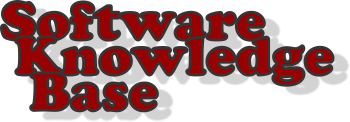Monetizers, or monetization, applies to both programs and web sites. Basically, it’s a method of making money on something free, using a third party to provide advertising (for web sites), or to bundle programs to install as “recommended” or “bonus” products (for downloads). These show up during the installation process, offering an unrelated product, frequently related to search, shopping, toolbars, or computer security. Each product that’s installed this way results in a commission back to the web site that hosted the download; that’s something to think about when you’re paying for a cleanup–there’s a web site with an address that profited from the infection of your PC.
What happens with monetizers is that a service company contacts either the download site or a software author, and offers money for wrapping the downloads in an installer. It all sounds quite tempting. Here’s a real letter I received, with only the product name removed:
Hi KnowledgeBase Webmaster,
I came across SWKB through a Bing search and wanted to see if you would be interested in testing our installer software to make more money from your downloads. Are you or your team available for a fact-finding chat soon?
[product name] helps publishers monetize free PC software downloads. What makes us better than our competitors is that we have a large pool of advertisers competing to have their offers presented within the installer. It is constantly optimizing to present only the highest-converting offers to the user, and we have the top earnings in the industry per user download.We’ve created many custom installer solutions for download portals (like KnowledgeBase) that handle heavy download traffic and have unique requirements. Our top partners are making over $30K per day with us.
Do you have a minute to discuss what you would need from an installer? We’d love to work with you on your downloads.
Thanks, looking forward to hearing back soon.
Brandon
It’s important to note here that while most of these monetizers and offers are showing up as wrappers added by software download sites, authors of software that have at least a few thousand downloads per month can also work directly with monetizer companies as a way of being paid for their work. For other authors, there are some download sites that wrap the product, and pay authors a portion of the income they make on offers attached to that free download. CAUTION: Those authors usually have their download pages point to a download site–it’s not a good practice, and it means that the product isn’t good enough to be profitable any other way.
Here’s another letter. Note the multiple trademarks, again, removed by me, because while some of these companies filter their “offers”, or claim to, I’m not going to give free publicity to any of them. I haven’t fixed the English errors. These are massive companies; they can afford “spel czheckerz.”
In light of recent events in the industry, we’d like to remind you that [new trademark] continues to be the most-trusted name in software monetization and distribution.
We began as a business unit of [old trademark], one of the web industry’s pioneers of engagement solution – http:// [yet another name]
I’ve taken a look on you website and I sure our solution will be a great suit to you, [new trademark]’s partners benefit from our long-term agreements with Google, Bing and Yahoo! and our products are certified safe by Symantec and McAfee, which makes us the ability to offer an high revenue to our partners.
Our complete monetization platform includes:
[new trademark] supports over 260,000 global software publishers and download portals, in more than 40 languages, and we can localize any of our products to suit your needs.
• Smart Installer: Monetize software with a smart installer.
• Business Models: Get paid per install (PPI) and Revenue share.
• Advanced Analytics: Analyze traffic, installs & boost revenues.To discuss your free monetization package, contact me by email, phone or Skype.
When these programs first started, around 10 years back, I participated in a small way–I installed the Google Toolbar, and was paid $1 per install. That lasted a year, and then the installed items became very different, and generally spyware or rogue security products. I chose not to offer those “offers” to my site visitors. I’m surprised any reputable site does offer these things–yes, they pay well, but the liability for the download site is very real.
These aren’t the only ways to make money from free apps and software. There’s also freemium, where there a publisher gives away a basic product, and sells a ‘pro’ version. Or there’s a free product with paid options inside. In games, that could be power-ups and cheat codes. In accounting software, that could be additional report formats, or payroll services. And some free software is made profitable by selling add-on services like custom configuration and installation. But these add-ons, upgrades, and services are from the same publisher or author as the original download, not from a monetizer company, and they aren’t wrapped around the download by a software directory.
by Jerry Stern
Archivist, Software Knowledge Base, and Tech, PC410.com

